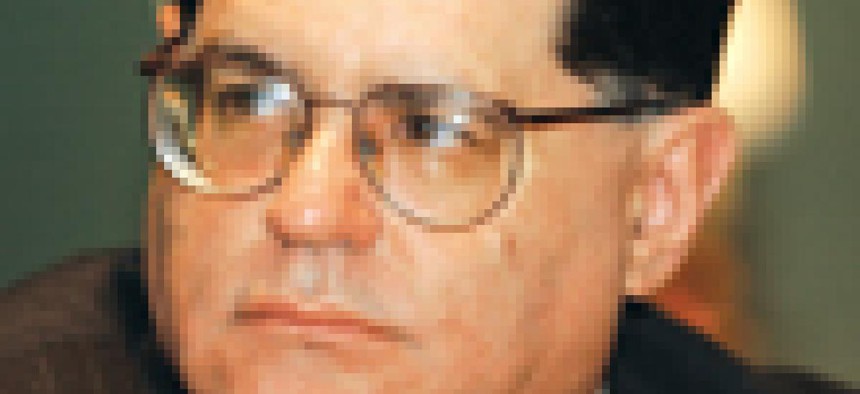As the intelligence community undergoes a period of transformation, contractors can help intel agencies promote information sharing capabilities and bring new technologies to bear on national security issues.Together, the 9/11 report, intelligence reform legislation and establishment of a new Director of National Intelligence have set a course for change in the way intelligence agencies do business, and "the IT community is definitely a critical player," said former Sen. Charles Robb (D-Va.). Robb was co-chair of the Commission on the Intelligence Capabilities of the United States Regarding Weapons of Mass Destruction. The commission, co-chaired by senior federal appeals court judge Laurence Silberman, examined the intelligence community's flawed assessments of Iraq's weapons of mass destruction programs. The commission's report, submitted March 31 to President Bush, called for greater use of advanced technologies in intelligence gathering.The nation's 15 federal intelligence organizations and other national intelligence centers are "behind the curve in applying cutting-edge technologies," the report said. New information-sharing technologies, such as data-tagging techniques that digitally mark reports or lines of text to let specific people or agencies access them, can improve information sharing in the intelligence community, Robb said. "Innovation can help bring together better, more tailored information to analysts' desks, and on the flip side, it also can help to prevent some of the mistakes highlighted in the Iraq study by helping to tag reports deemed to be fabrications," he said. "Enhancing the interoperability of the intelligence community information technology systems also will help to enhance interagency coordination."[IMGCAP(2)]William Dawson, deputy chief information officer for the intelligence community, said the enterprise architecture for information sharing is in place, but analysts need tools to help them extract and break down data instead of having to search for reports. "That's where the vendors come in to help us," he said.Dawson was part of a five-person panel at the Information Technology Association of America's May 12 symposium on information sharing and the intelligence community. Other participants were Liz Sampson, deputy director for community interoperability and information sharing, Office of Director of Central Intelligence; Robert Myhill, professional staff member, House Permanent Select Committee on Intelligence; Gordon Lederman, counsel on the special bipartisan staff of the Senate Homeland Security and Government Affairs Committee; and Sam Visner, a national security and intelligence expert, who was consultant to the President's Commission on Intelligence Capabilities of the United States. The symposium addressed the critical role of technology in improving the country's intelligence capabilities. The commission's report on the intelligence shortcomings that led to the Iraq war showed that better information sharing between intel agencies and other organizations was needed.The Intelligence Community Systems for Information Sharing is "the glue that ties various community mission architectures together so we can share across the board and send information back and forth," Dawson said. But this system needs to be able to share with those at other levels, to make information accessible to all, including state and local government and first responders, Dawson said.Vendors must understand the intelligence community's architecture, capabilities and programs to determine whether they have the tools that fit that architecture instead of offering off-the-shelf technologies that create more stovepipes, Visner said."We are part of the intelligence community, and if we don't act like we're part of the intelligence community, then we'll wait for the intelligence community to issue requirements, and we will respond to those requirements in various stovepipe and parochial ways," he said.[IMGCAP(3)]Myhill said a secure information network is in place, but that vendors must "try to help out and fill the gaps pointed out by the weapons of mass destruction and other inquiry commissions." This includes enterprise content management and analytical tools, he said.When later asked about data sharing among intelligence organizations, Myhill said: "The problem is not connecting and logging into someone else's network -- that can happen. It's getting the right information to the right people at the right time."Another area where vendors will play a role is in providing real-time information sharing among the entire intelligence community network, Lederman said. Even though the intelligence community has made some reform progress since Sept. 11, it still is impeded by some institutional stumbling blocks. "In the three and a half years since Sept. 11, the push to share information has not spread as equally to other areas, including counter-proliferation where sharing is urgently needed," Robb said. "Furthermore, even in the counterterrorism context, information sharing still depends too much on physical co-location and personal relationships as opposed to an integrated communitywide information network." Equally important is that agencies and departments act as though they own the information they collect, forcing others to pry it from them, he said. The commission co-chaired by Robb has called for the use of advanced technologies for increased and secure data exchange. The commission also said there is a need for new technologies that can exploit large amounts of foreign language material without using human translators. New databases are needed to process intelligence, and technology is needed to update analysts and decision-makers when intelligence judgments change.Staff Writer Roseanne Gerin can be reached at rgerin@postnewsweektech.com.
Liz Sampson from the Office of Director of Central Intelligence (left) and William Dawson, deputy chief information officer for the intelligence community, were part of a five-person panel at an Information Technology Association of America symposium on information sharing and the intelligence community.
Rick Steele
"Enhancing the interoperability of the intelligence community information technology systems also will help to enhance interagency coordination."? Former Sen. Charles Robb (D-Va.)
Rick Steele
"We are part of the intelligence community, and if we don't act like we're part of the intelligence community, then we'll wait for the intelligence community to issue requirements, and we will respond to those requirements in various stovepipe and parochial ways." ? Sam Visner, a national security and intelligence expert
Rick Steele



